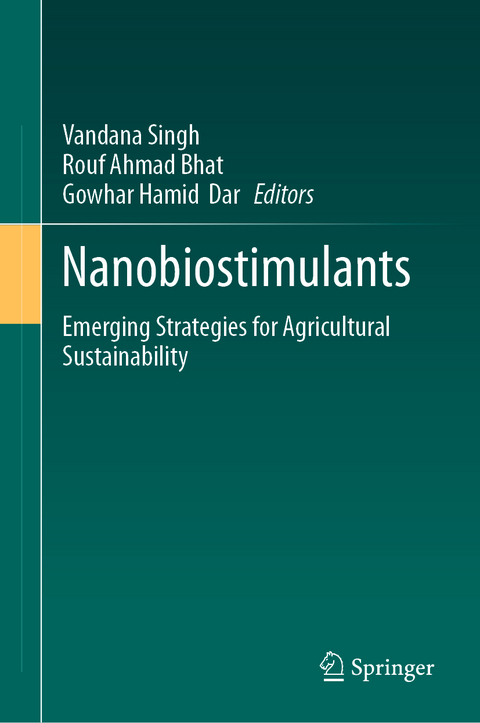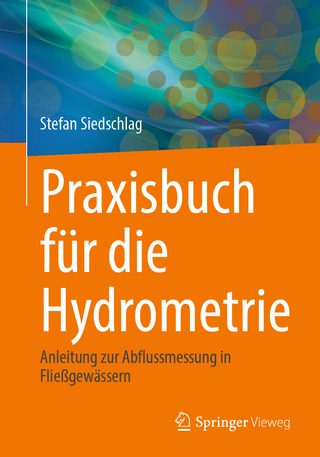
Nanobiostimulants
Springer International Publishing (Verlag)
978-3-031-68137-0 (ISBN)
- Noch nicht erschienen - erscheint am 03.12.2024
- Versandkostenfrei
- Auch auf Rechnung
- Artikel merken
The book describes how nanobiostimulants, which are nanoscale materials that can enhance plant growth and productivity, have the potential to revolutionize sustainable agriculture practices. The book covers a wide range of topics, including the properties and functions of nanobiostimulants, the mechanisms behind their effects on plant growth, and the potential risks associated with their use. It also discusses how nanobiostimulants can be used to improve soil health and nutrient uptake, enhance plant resistance to environmental stresses, and increase crop yields. Overall, the book provides a comprehensive overview of the emerging field of nanobiostimulants and its potential applications in sustainable agriculture. It will be of interest to researchers, students, and professionals in the fields of agriculture, nanotechnology, and environmental science.
Dr. Vandana Singh (Ph.D.), an Assistant Professor in the Department of Microbiology at Sharda School of Allied Health Sciences of Sharda University, holds a Ph.D. in Microbiology. She earned her M.Sc. in Microbiology from the University of Pune, Pune(India) and then She completed her Ph.D. in Microbiology from Noida International University, Noida (India). With over 14 years of teaching and research experience, her areas of expertise include Microbiology, Environmental microbiology, Food microbiology, Microbial nanotechnology, Nanomaterials, and microbial biotechnology. Her passion for microbiology is evident in her dedication to producing good-quality research, leading to numerous publications in the form of research articles, review papers and book chapters, in peer-reviewed and reputed journals. Her research interests focus on Microbial Fuel cells, Wastewater Treatment, Biological Wastewater Treatment, Environmental Biotechnology, Bioremediation of Water and Wastewater Treatment, Biodegradation, Biofilms production, Biosurfactant production, remediation of pollutants etc.
Dr. Rouf Ahmad Bhat (PhD) has pursued his doctorate at Sher-e-Kashmir University of Agricultural Sciences and Technology Kashmir (Division of Environmental Sciences) and presently working in the Department of School Education, Government of Jammu and Kashmir. Dr. Bhat has been teaching graduate and postgraduate students of environmental sciences for the past 3 years. He is an author of more than 55 research articles (h-index 30; i-index 49; total citation 3167) and 40 book chapters, and has published more than 40 books with international publishers (Springer, Elsevier, CRC Press Taylor and Francis, Apple Academic Press, John Wiley, IGI Global). He has his specialization in Limnology, Toxicology, Phytochemistry, and Phytoremediation. Dr. Bhat has presented and participated in numerous state, national, and international conferences, seminars, workshops, and symposium. Besides, he has worked as an associate environmental expert in World Bank-funded Flood Recovery Project and also the environmental support staff in the Asian Development Bank (ADB) funded development projects. He has received many awards, appreciations, and recognition for his services to the science of water testing, air, and noise analysis. He has served as an editorial board member and a reviewer of reputed international journals. Dr. Bhat is still writing and experimenting with diverse capacities of plants for use in aquatic pollution remediation.
Dr. Gowhar Hamid Dar (PhD) currently works as Assistant Professor in the Higher Education Department, Govt. of J&K and is currently posted in Govternment Degree College Kulgam where he serves as Head, Department of Environmental Science and Coordinator, Internal Quality Assurance Cell (IQAC). Before this he was posted at Govternment Sri Pratap College Srinagar, the oldest higher education institution of the UT of J&K, India. He has a PhD in Environmental Science with specialization in Environmental Microbiology (Fish Microbiology, Fish Pathology, Industrial Microbiology, Taxonomy and Limnology). He has been teaching postgraduate and graduate students for the past many years at Postgraduate. He has more than 70 research articles (h-index 17; i-index 24; total citation >1000) in international and national journals of repute and a more than 20 books with international publishers (Springer, Elsevier, CRC Press Taylor and Francis, Apple Academic Press, John Wiley, IGI Global) to his credit. Moreover, he supervises several students for the completion of degrees (PhD/Postgraduate). He has been working on the Isolation, Identification and Characterization of microbes, their pathogenic behaviour and impact of pollution on d
Chapter 1: Introduction to Nanobiostimulants in Sustainable Agriculture.- Chapter 2: Nanofertilizers: A new frontier in agriculture.- Chapter 3: Green Synthesis of Nanobiostimulants and their applications.- Chapter 4: Valorisation of biomass to bio stimulants.- Chapter 5: Nanobiostimulants and Plant-Microbe Interactions.- Chapter 6: Nanobiostimulants for Enhancing Plant Growth and Yield.- Chapter 7: Nanobiostimulants: Precision tools for harnessing soil microbes and elevating agricultural productivity.- Chapter 8: Nanobiostimulants for Enhancing Plant Stress Tolerance.- Chapter 9: Harnessing Nano Bio-Stimulants for Sustainable Agriculture: Unraveling Plant-Microbe Synergies.- Chapter 10: Nanobiochar - A Nanostimulant for Enhancing Soil Quality and Sustainability.- Chapter 11: Nanobiostimulants : the nanoscopic bioeffecttors in Seed germination and Plant Establishment.- Chapter 12: Nanobiostimulants and Plant Secondary Metabolites.- Chapter 13: Nanobiostimulants and Sustainable Crop Production.- Chapter 14: The Role of Nanobiostimulants in Modulating Plant-Microbe Symbioses for Enhanced Crop Productivity.- Chapter 15: Nanobiostimulants and Climate Change Adaptation in Agriculture.- Chapter 16: Nanobiostimulants and Precision Agriculture: A Data-Driven Approach to Farming and Market Dynamics.- Chapter 17: Commercialization and Market Potential of Nanobiostimulants.- Chapter 18: Environmental Impacts of Nanobiostimulants.- Chapter 19: The world of nanobiostimulants impacting the environment.- Chapter 20: Nano-biostimulants For Improving Plant Roots Regulations and Nutrient Uptake.- Chapter 21: Ecological Perspectives on Nano-Biostimulant Applications in Agriculture.
| Erscheinungsdatum | 12.11.2024 |
|---|---|
| Zusatzinfo | XXIII, 509 p. 53 illus., 51 illus. in color. |
| Verlagsort | Cham |
| Sprache | englisch |
| Maße | 155 x 235 mm |
| Themenwelt | Technik ► Umwelttechnik / Biotechnologie |
| Schlagworte | Biotechnology • Green Synthesis • Nanobiostimulants • Nano-fertilizers • plant-microbe interactions • Soil quality • sustainable agriculture |
| ISBN-10 | 3-031-68137-1 / 3031681371 |
| ISBN-13 | 978-3-031-68137-0 / 9783031681370 |
| Zustand | Neuware |
| Haben Sie eine Frage zum Produkt? |
aus dem Bereich


